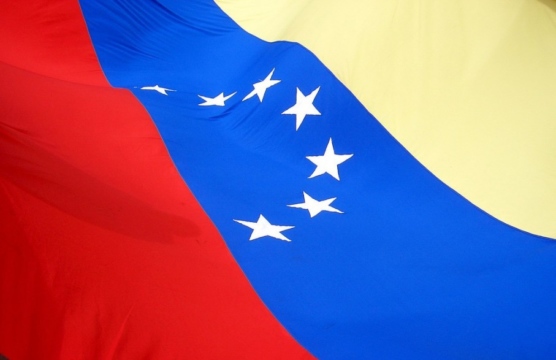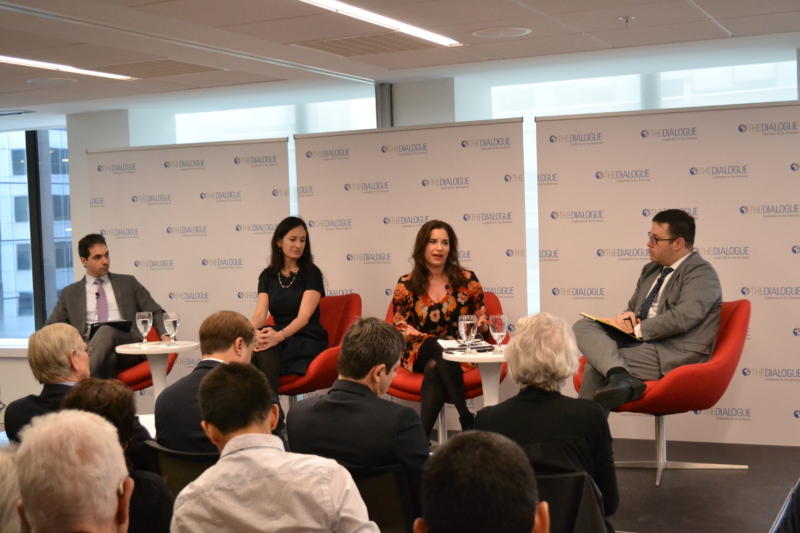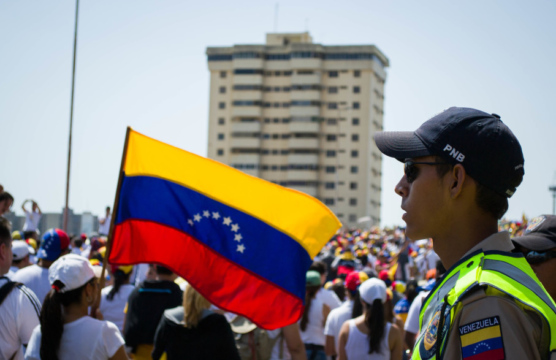
Falling Oil Prices Push Venezuela, Maduro Closer to the Edge
With crude oil prices down 25 percent since June and holding at roughly $86 a barrel on Tuesday, Venezuela is getting nervous.
On April 2, the Inter-American Dialogue in partnership with the Council on Foreign Relations (CFR) hosted an event titled “Venezuela’s Migration Crisis.” This discussion, which was moderated by Michael Camilleri, featured panelists Shannon O’Neil from CFR, Francisca Vigaud-Walsh from Refugees International, and Dany Bahar from the Brookings Institution. This conversation explored the current status of the migration crisis, the US and international community’s response, and the challenges going forward.
As presented in various news reports, Venezuela’s economic, social, and democratic deterioration is producing a massive outflow of migrants leaving the country. The problem has become regional as receiving countries like Colombia, Brazil, and Ecuador are trying to figure out how to respond. Many experts have argued that the regional response has been piecemeal and fragmented with little international support, no mechanisms for burden sharing, and limited resources to cope overall.
“UNHCR estimates that an additional 1.7 million Venezuelan will become refugees in 2018. The international community has provided $46 million in aid with only $2.5 million coming from the United States. “ - @cubanahumana #VenezuelanMigration pic.twitter.com/4Buyd2miui
— The Inter-American Dialogue (@The_Dialogue) April 2, 2018
The United States has few tools to change the course of Maduro’s regime, according to O’Neil. The government has been imposing sanctions on the government’s assets and allies with other countries following the lead. But, she argues, sanctions are only effective when asking for a change in behavior not a change in regime – the Trump administration has made clear that it wants the latter. “Sanctions are a blunt tool that takes a long time to take any effect. The international community should focus on more effective ways to tackle the humanitarian crisis.”
To further complicate the matter, both O’Neil and Vigaud-Walsh argued that the international community is not giving the crisis the attention it deserves. Unlike previous refugee crises, Venezuela’s is not happening under the context of a war. But the humanitarian crisis is so dire that it demands an international response. Even when the international community has responded, it has been slow, weak, and atypical in comparison to other cases. The UN High Commissioner for Human Rights (UNHCR) has mostly engaged the crisis through internal advocacy and fundraising with global partners. According to Vigaud-Walsh, “UNHCR estimates that an additional 1.7 million Venezuelans will become refugees in 2018. The international community has provided $46 million in aid with only $2.5 million coming from the United States.” This, coupled with the fact that most governments in the region have tight budgets for humanitarian aid, leaves a very protracted, uncoordinated response.
Besides the limited resources for a regional response, the panelists were concerned about the leadership vacuum in the region due to the resignation of Peruvian president Pablo Kuczynski, who congregated the Lima Group, and the upcoming elections in various Latin American countries. There is uncertainty about whether incoming leadership in key countries such as Mexico, Colombia, or Brazil will speak up about the humanitarian crisis.
Bahar highlighted some of the costs of the refugee crisis. Based on his estimates, the costs of hosting refugees ranges from $2.8 to $5.2 billion. This is based on the cost of hosting one refugee per year based on Germany and France’s estimates for Syrian refugees.
There are a few challenges that should be acknowledged. First, the Maduro regime has made it extremely difficult for humanitarian aid and assistance to reach its intended recipients. Bahar and other experts have argued that aid is being used as a political tool. Second, refugees that fled to Venezuela during the Colombian civil war remain in regions outside government control. Third, countries experiencing refugee inflows could see their politics impacted, especially in the midst of a region-wide electoral season. The ongoing developments may dictate whether foreign policy gains a space in the regional dialogue.
Looking ahead, the panelists agreed that host countries must recognize the expertise and capabilities of UN refugee agencies and NGOs to coordinate and manage the crisis. The lack of a coordinated regional response may be perpetuating the current situation. Looking forward, the European refugee crisis may serve as a case study on how Venezuela’s neighbors should react.
With crude oil prices down 25 percent since June and holding at roughly $86 a barrel on Tuesday, Venezuela is getting nervous.
Can the government led by Nicolas Maduro survive the wave of street protests that have spread throughout Venezuela over the past two weeks?
Deadly protests, the largest since President Nicolás Maduro’s election last year, have wracked Venezuela in recent weeks.
 Irene Estefanía González / Inter-American Dialogue
Irene Estefanía González / Inter-American Dialogue
